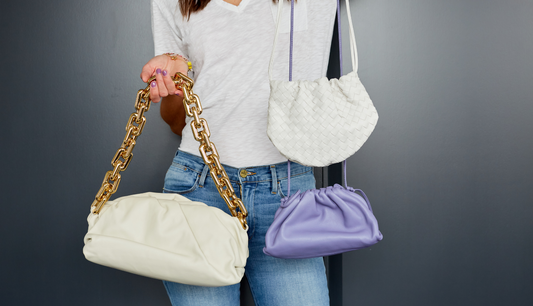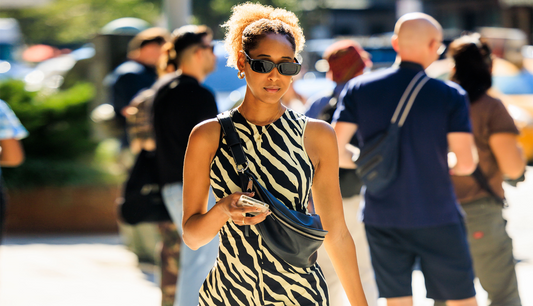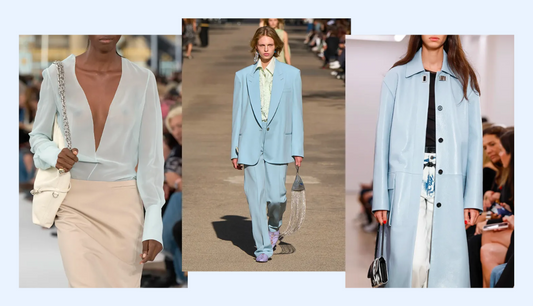
Sustainable Fashion: Not Just A Fad
With sustainable fashion news being released daily, it can become hard to stay updated on all the different buzzword terms and definitions. It feels like a new sustainable fashion term comes with every new article I read these days.
Although the buzzwords are often interchanged amongst most headline stories, ethical, conscious, and circular fashion have different meanings and strategies that work towards a similar goal of improvement, growth, and being more sustainable.
As a consumer and someone inspired to learn about the fashion industry's impact, these are key definitions to understand. Keep reading for a summarized guide on these expanding fashion concepts that will help make your next fashion newsletter reading and scrolling a little easier to understand!
So lets start with the biggest buzzword that acts as an umbrella term for the other three, sustainable fashion. This term is used to describe the impact of fashion on the environment and people. It covers water use, pollution, production waste, fair wages, biodiversity, and safe working conditions.
For a product to be considered sustainable, it had to have been produced or accessed responsibly and ecologically. It is hard for a brand to be 100% completely sustainable, which is where the conversation of transparency comes up.
“This means simply shopping for items labeled ‘sustainable’ is not enough; we need to completely rethink our purchasing habits and the way we consume clothes,” said Vogue. Their article highlights a great list of everything you need to know about being sustainable with your fashion choices.
Conscious and ethical fashion fall under the umbrella. Conscious fashion focuses explicitly on goals related to improving our environment. Brands striving to be eco-friendly are trying to minimize the negative environmental impact their production causes or instead simply have a more positive effect.
Ethical fashion is about fashions effect on our labor workers. The behind-the-scenes work can become disregarded, and ethical fashion is trying to bring those hidden issues to the forefront. This term opens conversations about child labor, sweatshops, and labor abuse.
You may have seen the hashtag #WhoMadeMyClothes circulating on social media in April during Fashion Revolution week. Consumers were encouraged to share their clothing tags and inspire change in valuing people over profit. There are real people behind our clothes, and they MATTER! Read Fashion Insiders' & Co article on how the movement started.
Ethical fashion also covers animal cruelty and encourages more vegan and holistic alternatives. One of my favorite pages is Redress Raleigh, where they break down these terms with visuals and statistics.
Lastly, the newer concept of circular fashion is all about reusing. “A circular model which moves away from the linear process of production that most textile and garment companies follow, circularity is a system of frameworks that tackles current environmental issues like climate change, pollution, waste, and loss of biodiversity.”
Just like it says in the title, it’s all about keeping fashion in circulation. The next time your favorite pair of jeans get an unexpected hole, circular fashion opens up many more solutions other than throwing away or buying a new pair. This made fashion brands reconsider their production strategies and move towards improving the lifespan of their items.
Examples of circular fashion are resale, rental, clothing swaps, garment repair, and upcycling. Circular Fashion is celebrating second-hand and showing consumers how to make used clothes into new clothes.
To summarize, conscious fashion involves the environment. Ethical fashion concerns human and animal rights, and circular fashion improves fashion's lifespan, reducing pollution and waste.
All these work together to form sustainable fashion, which we continue to fight and work towards as the industry grows. Even though we see these terms trending in our fashion newsletters daily, educating ourselves is helping make sustainability more than just a buzzword. Fads fade, but sustainability is the future so keep learning and being a changemaker for the industry we all love and adore.
-As always, elevate your wardrobe with respected fashion and embrace the shift in style.
You may also enjoy
-
 Read More
Read MoreDon’t Sell, Just Swap…or Rent?
Clothing swaps aren’t a new concept. If you had a sibling growing up, you probably have closet-sharing in your veins. However, the concept of swapping clothes has evolved into a...
-
 Read More
Read MoreOver Florals? Rent These 5 Prints Instead.
Is wearing florals in the spring becoming a fashion faux pas? That’s to be debated, but here's the scoop: according to @databutmakeitfashion, floral fashion has decreased by 15% this month,...
-
 Read More
Read MoreIcy Blue: Spring’s Coolest Shade to Rent
With a new season comes a new color palette. While we say goodbye to winter, one of its ethereal shades remains—icy blue. This latest addition to the minimalist palette exudes...




